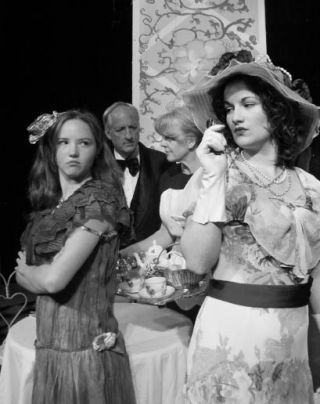on the boards
Oscar Wilde, the Irish playwright, knew plenty about lying, so it’s no surprise that his witty and very funny play, “The Import-ance of Being Earnest,” centers on deception.
Being homosexual in 19th century England meant hiding one’s true identity, and Wilde pretty much did that until the Marquis of Queensberry — whose son Lord Alfred Douglas was Wilde’s lover — successfully outed Wilde in 1895.
That was the year of Wilde’s last play, “Earnest,” which completes its excellent Drama Dock run this weekend at the Vashon High School theater.
Everyone lies in “Earnest.” Algy and Jack, well-off young men about town, deceive friends with made-up relatives whose “illnesses” become excuses for leaving boring situations.
Why do Jack and Algy do that instead of telling the truth (they’re bored) or even making up less dramatic stories (a business appointment might have done as well)? It’s English Victorian society, with all its niceties, shot through with pretense. And Wilde both exposes and cloaks it, and humor is his weapon.
When nubile Gwendolyn says, “My ideal has always been to love someone of the name of ‘Ernest,’” her vapidity is hilarious. And when the even more nubile Cecily, whom Algy craves, says, “I don’t like novels that end happily. They depress me so much,” it’s funny in the unexpected way Wilde has, of turning the tables on what we expect. (Happy endings ought not depress.)
His renowned epigrammatic style — witty and humorous — itself hides his own true pain, which is simply that he’s very familiar with unhappy endings.
When the very, very complicated convolutions of the plot (which resemble those of a very good sitcom) eventually lead to happy liaisons among three couples (all heterosexual), we see Wilde’s last fling with comedy.
“Earnest,” now one of the great plays of the Western canon, ran only 83 performances in its first run, partly because of Queensberry. Homosexuality was illegal in Wilde’s day, and Wilde’s life ran downhill into a depressing exile in Paris, where he’s buried in the same cemetery as Jim Morrison of The Doors.
The show’s a knockout, with excellent performances by Alexander Nicholas as Algy, who looks like Wilde and is great at arched eyebrows and other facial expressions (but, as a first-time actor, needs work on projection and enunciation), and by the energetic and focused Adam Brock as Jack.
Gaye Detzer tops her recent very good Drama Dock work with a convincingly acid portrayal of Lady Bracknell, Algy’s aunt. And Madelaine Ripley and Zoey Rice offer rich contrasts as Gwendolyn and Cecily: Ripley is well-dressed, composed and immaculately made-up, while Rice (also a first-timer) is clad like a flower-child of Victorian romance and captures well Cecily’s clever silliness.
Bette Kimmel and Chris Ott, two acting veterans, effectively present the third couple, Miss Prism and Rev. Canon Chasuble, two near-geriatrics acting like teenagers.
Since the characters are all upper class, the play has servants, three of them, with Peter Kreitner’s warily huffy Lane (Algy’s servant), Kirk Beeler as the wonderfully bored Merriman (Jack’s servant) and Sue DeNies in a walk-on as the maid.
The play is directed by Elizabeth Ripley, a longtime Vashon resident and professional actress, director and opera singer. In an unusual twist, she chose to set the play in the 1930s, giving it an Art Deco look that works well with the costumes, characters and tone of this classic play.
— Eric Horsting, a freelance writer, is The Beachcomber’s former arts editor.


